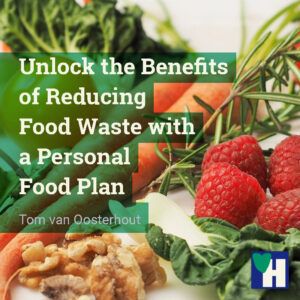
The best way to start to reduce food waste is by developing a Personal Food Plan. This plan helps you to reduce food waste by reflecting on why, what, when, how, and where you eat.
Your Personal Food Plan has many more advantages, but for now, I stick to the benefits of reducing food waste. Write your Personal Food Plan down on your laptop or mobile, or by hand in a journal.
I will explain the details of the plan in this article. At the bottom of the article, you find a link to an example of a Personal Food Plan.
Some of the links are affiliate links. As an affiliate associate, we earn a commission when you purchase any of the products offered through the shared links at no extra cost for you. This helps us maintain this website.
Table of contents
The benefits of reducing food waste
The benefits of reducing food waste are economic and environmental. When we pay more attention to the food we waste, we start to economize and contribute to a more sustainable world.
Why do we eat food?
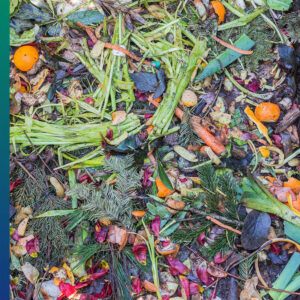
Try to answer this question as honestly as possible: why do I eat food? To stay alive is not the right answer, anybody can figure that out. You have to be more honest.
I like food because of its tastes. I’m serious. In the morning I eat fruit. This morning: a little apple, a kiwi, a mandarin, a pear, and a banana. If it was only for the taste of food, I would eat fruits all day.
However, I also very much like lightly spiced vegetables baked in a little bit of excellent olive oil with lots of garlic. Or my favourite pumpkin soup with parsnip, Curcuma, and freshly grated ginger. My mouth starts watering when I write this down. I can go on endlessly about all the types of food I like for their taste.
Related: Is Curcuma Healthy or Should we Avoid Eating it?
Why reduce food waste?
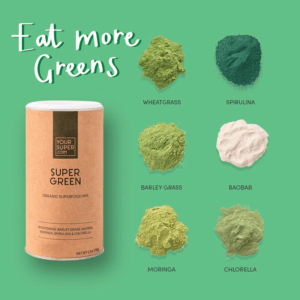
For many years now we have only eaten organic food and most of it is fresh. We buy it at specialized shops or at a marketplace.
In our kitchen garden, we try to grow some organic food as well. The herbs are okay, yet the rest is still a try-out.
The advantage of growing our own food is that we started to understand how difficult it is to produce organic food.
This made us even more respect the farmers that grow the organic food we eat every day. And it made us aware of the benefits of reducing food waste.
To produce organic food is a very complex matter. The bureaucracy surrounding the production, handling, and distribution drives up the prices of organic food. This and the effort it takes to grow organic food incites us to use as much of the food we buy as possible.
And this is also why our kitchen garden is important. We compost the residue of the foods we prepare. Such as the skin of the fruits we eat. The compost is used to fertilize the kitchen garden. Composting is a genuine way to enjoy the benefits of reducing food waste.
What is food waste?
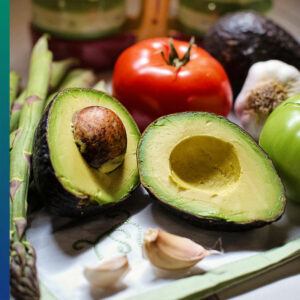
To our regret, organic food in supermarkets is often packaged in plastic. But this is not the type of waste I refer to.
Nor do I want to talk about the food that passed its expiration date. Fortunately, more frequently than ever supermarkets bring these products to food banks.
Food waste is for instance the skin of the fruits I eat in the morning. Or the food we throw away because it got rotten, or the food leftovers nobody wants to eat anymore.
Most fruit skins and some parts of vegetables, such as the skins of onions and garlic, are not made for consumption. This type of food waste goes on our compost pile.
To prevent rotten food is a planning and shopping effort. Check the food you select on a need to prepare basis. Leftovers can be consumed the following day. Often they taste even better than the day before.
Related: How to Start Organic Composting at Home Immediately
Watch your eating patterns
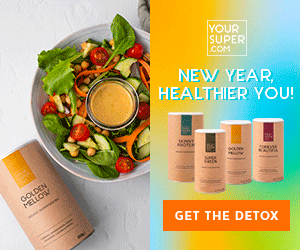
Write down in your personal food plan how many times a day you eat. No matter how small a piece of food is, write it down.
I just consumed 8 dates. Don’t think that’s just a snack, dates contain a lot of nutrients and calories. So, don’t leave out sneaky snacks and certainly not sugar-free cookies. Don’t forget to write down your drinks.
We eat twice a day. Breakfast early in the morning and lunch around two o’clock in the afternoon. We alternate 2 courses for lunch.
Eating either soup or salad and a main course or a main course and dessert. Around five o’clock we eat a small snack. After 7 pm I eat nothing anymore, Hannie quits eating at 5 pm.
Why should you write all this down? The main reason is to discover patterns in your food consumption. Such patterns help you to decide how much food you have to buy and when. It also helps you to plan your Preparation Schedule as a part of your Personal Food Plan. In the end, it helps you to control your eating habits.
Related: Why are Dates Good for Us? 10 Pros and 4 Cons, plus a Quick Recipe
Plan and schedule food preparation
Using a Personal Food Plan and a Preparation Schedule might give you the idea that our household is tightly organized. But it’s not. I rarely know 15 minutes before I prepare dinner what we’re going to eat.
That’s the advantage of a plan and a schedule. I can change the components of what I prepare as often as I want. Given the food available. The available food is planned, the time we eat is planned. However, not the components of what we eat nor how the components are prepared.
The plan and the schedule give me all the freedom I want. At the same time, they control the benefits of reducing food waste. Is this what is called a win-win situation? The plan and schedule also help us to eat together as much as possible. For as long as I remember we invest a lot in eating together.
No hassle
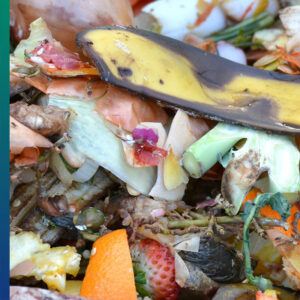
The day we started discussing our Personal Food Plan we stopped eating while watching TV, which we used to do. Breakfast and lunch are moments to invest in each other, not in the mind-numbing moving images others come up with.
We never eat in bed. Nor at our desks during working hours. With the exception of our very small five o’clock afternoon snack. We take our time during breakfast and lunch. You never know where the discussion might go.
Before the virus, we used to eat out once a week. I only miss it because that is the day I don’t have to prepare lunch. I don’t gain any time eating out, but not having to be troubled by all the hassle is nice now and then.
Eating out is however very complicated. We’re very picky at what we want to eat. Eating out is standard non-organic. You’d be surprised realizing how many Spanish food chefs sprinkle salt and sugar on all of it!
Guns, germs and steel
There’s no doubt that guns, germs, and steel changed our lives fundamentally. Jared Diamond pointed that out convincingly in his magnificent book carrying this title. It’s subtitled: a short history of everybody for the last 13,000 years.
The most fundamental change, Diamond states, is that in our modern times only very few people have to spend all day looking for food. Supermarket food comes from long and institutionalized supply lines connecting highly industrialized farms with extremely large urbanized areas. Only a handful of people decide what we eat every day.
Not much romance is left in the outdoor and farming life. Like ostriches, we stick our heads in the ground and dream of all our favourite recipes presented to us on TV and the Internet by chefs that usually know very little of the origins of food. Stop wasting your time on this, go your own way.
Veganuary
A very sympathetic example of the way you can go with your own food is veganism. Since 2014, the first day of each year a 31-day challenge starts called Veganuary.
Thousands of people try vegan for January. Most of the people who did continued afterwards with a vegan lifestyle at home.
In addition, more and more shops and restaurants drive up the vegan food provision.
Veganuary is a global movement dedicated to a world without animal farms and slaughterhouses. In its own words: “A world where food production does not decimate forests, pollute rivers and oceans, exacerbate climate change, and drive wild animal populations to extinction.” We couldn’t agree more.
Embrace the benefits of reducing food waste
When we embrace the benefits of reducing food waste, we support our wallet, the organic farmers, the environment, and biodiversity. I bet you never thought you could gain so much from the benefits of reducing food waste.
Our efforts to reduce food waste are supported by our Personal Food Plan. This plan is not a straightjacket but a diving board into freedom with a conscience. Anybody can opt for this type of freedom. It will make you happy and a better person.
Do you make a food plan at times? Tell us in the comment box below.
Get instant access to your own Personal Food Plan

Privacy Policy: We hate spam and promise to keep your email address safe.

Hello there Tom! Thank you very much for sharing with me this wealth of information. This article has really given me an insight as to why one must be eco-friendly and prevent wasting food as much as possible. I will definitely do better from now hence forth. Going to draft my personal food plan right away.
Hi Hannie
I must have been living with my head in the sand like the ostriches you mention as I had never heard of Veganuary until yesterday. Unfortunately, we had Alaskan crab legs on New Year’s Day so I botched the chances of going 31 days vegan right on day 1. We have had drives at work to reduce food waste and we make sure that all the catering waste is composted so at least we are taking care on that end. At home, though we have a sort of unofficial compost area in the back yard. I keep telling myself we will do a better job of this when we move to another place. I appreciate the reference to Jared Diamond, in addition to Guns Germs and Steel, I would thoroughly recommend Collapse.
Here is an off-the-wall thought – one way to cut down on food waste is for all of us to behave like old souls. If a young soul finds a piece of fruit with a bruise, they are likely to throw the whole thing away. An old soul just eats around the bruised part.
Best regards
Andy
Hi Andy,
To be honest, the first time I learned of Veganuary was when I was writing the article and did some research into vegan. We’re not 100% vegan. However, we sympathize with the idea and eat vegan most of the times.
Good of you to mention the food waste control at your work. We tend to forget that there is of course a whole world of catering services in offices, hospitals, factories, airports etc. Not to mention all the little sweat shops where catering food is prepared. Although sweat and food are not the best combination.
Probably a lot of animals appreciate your unofficial compost area. Here there are always birds and salamanders and hedgehogs eating my compost away. It’s also crawling with all kinds of insects. Guaranteeing the bigger animals get their proteins.
Glad you appreciate Diamond as much as I do. I like The Third Chimpanzee because he calls us the human animal. I’m not sure however whether that is a compliment for chimpanzees and the other animals. You should also read Frans de Waal’s The Age of Empathy. Nature’s Lessons for a Kinder Society. He is already for a very long time professor at the Emory University in Atlanta and responsible for Living Links which is part of the Yerkes National Primate Research Center of the same university.
Apples and pears can rot pretty quickly. Especially at the end of the season. What I do, is that I buy the apples and pears at our organic shop that are just at the edge. At home I immediately clean the fruit and boil it with a little bit of water. This gives us a very tasty apple-pear compote. You’re right though, this must be an old souls thing.
Thank you for your comment.
Regards,
Tom
I would love to try your pumpkin soup, it sounds delicious!
I eat 3 or 4 times a day, usually 3, but sometimes I add a snack in between which are often nuts and sometimes dates as well. I love dates, and I planted 3 date palm trees on my property which are still growing, they are not that big yet.
When it comes to cooking, I think our methods are very similar. I never know what I’m going to eat until I open the drawers and fridge and have a look around. I always improvize my meals and I rarely follow recipes unless I am interested in learning something new.
I have no food leftovers, simply because I eat everything I cook. I also cook for my dogs and they also lick their bowls clean 🙂 And fruit peels or other rests are used for compost for plants.
When I grew up, my father had lots and lots of food waste and he and his wife (not my mother) always threw so much food away, they even did it with glee, as if they were proud of the ability to do that. I understand that my father grew up very poor (after WWII), (which is maybe why wasting food represented wealth and abundance?) but my mother also grew up poor, and she never wastes any food. I always felt bad for the amount of food my father and his second wife wasted … I hate wasting food and also water.
Hi Christine,
Pumpkins grow here all year around. There is even a pumpkin named after the village where we live because it originated here. Today I prepared pumpkin soup with celery, bell peppers, courgette, parsnip and very young and fresh garlic. No herbs added. In half an hour we will find out how the soup tastes.
Of course it is never too late to plant trees. However, sometimes I am saddened because our trees grow that slow. We have two figs, an olive tree and an almond tree. Last year we had one fig, 2 olives and no almonds. As a matter a fact I was surprised the trees gave any fruits at all because they’re so small.
It’s interesting to see that our parents react differently given their similar experiences of wartime and relative poverty. My parents in law where frugal up to a certain point, although they had enough money. When the kids moved out of the house they spend all their money on travel. My own parents had 5 children (including myself). Yet I never had the idea we were poor. Although my father did not earn much money (my mother never worked but at home raising children).
Living in a warm, a very warm, climate makes you sensitive to food, water and energy issues, I guess. It’s the same here. In Spain there is also an incessant debate about the distribution of water across the wet and dry sections of the land. We live almost next to what is called a trasvase. It’s a canal, about 2 meters deep and 3 meters wide, tapping water from a river 50 kilometers away and distributing it to the large agricultural along the canal.
I’m now going to finish and eat my soup.
Stay safe, stay healthy.
Regards,
Tom
Hi Tom, fabulous article. I agree with making conscious food choices and reducing waste as much as possible.
We are not vegan (I think I could become vegan much easier than Rick) but I do ensure we do not waste.
We did have traditional turkey at Christmas but we consumed the leftovers during the rest of the week in other various dishes. I also made a wonderful soup after boiling the bones then straining the juice and adding other leftovers.
Here in Atlantic Canada we grow a vegetable garden each summer and enjoy many fresh vegetables such as peas, beans, lettuces, kale, spinach, zucchini, peppers, hot peppers and tomatoes.
I freeze or can many vegetables for use in winter.
We also have an apple tree, rhubarb, raspberry, blackberry and wild strawberries that I also harvest and can.
We compost our kitchen scraps and use them in the garden along with the leaves from our four huge maple trees in the front yard.
I do find we are eating less in recent years and I think that is because we are paying closer attention to how our bodies feel and no longer overindulge in food.
Do you think we require less food as we age?
Hi Deb,
Thank you for your comment and your compliments.
To answer your question, yes, when we grow older we require less food. There is though some danger in this straightforward answer. When elderly have to stay in a hospital or move to a nursing home, they commonly have a nutrient deficiency.
This nutrient deficiency is caused by the fact that they eat less healthy food or they lost their appetite (due to loneliness or a decease or just because they grow old, because when we grow old we slowly loose our taste). Usually older people choose food that is easy to prepare and fast to eat. Apparently when you grow older you sometimes loose the energy to prepare a proper meal, let alone 2 or 3 times a day.
To be honest, in general, most people who leave the hospital lost 35% of their weight. This is because most people don’t like the, always very healthy, hospital food. Of course, there is usually not much fun in lying in a hospital bed. Medication and anesthetics can hamper our taste for food or appetite. But the overall reason people eat little when they’re in the hospital is because the food is not what they’re used to eat at home.
Habituation is tricky and risky when it comes to food consumption and nutrients. We tend to prepare the food we enjoy. Day in, day out. On the long run habitual food consumption comes with the risk of a nutrient deficiency. The best way to counter this risk is by regularly renewing one meal a week. Off late I started to cook Indian style food. With my own twist of course.
We’re no 100% vegan. Although we sympathize with the idea and often eat vegan. Once a week we eat a bit of organic chicken, turkey or fish.
I must admit, I’m a bit jealous of your garden. You apparently have the space to grow all those different fruits and vegetables. Even though we can harvest fruits and vegetables twice a year because of the abundant sun shine, we only have a very limited amount of space to grow our own food. This is partly because the pine trees surrounding our garden made and makes the soil acidic. That’s good for the strawberries, but most other fruits and vegetables don’t like an acidic soil.
Enjoy your garden. Stay safe, stay healthy.
Regards,
Tom
Thanks, Tom, for answering my question in such detail. I really appreciate that.
I agree that many people don’t like hospital food because it isn’t what they are used to. Any time I was in hospital I didn’t mind the food. It was a bit bland but I really didn’t mind it. I am assuming that is because I normally eat healthy food before being in the hospital.
When our grandson spent a week in the hospital when he was initially diagnosed with type 1 diabetes we had a family dinner planned for our son and his family as they were moving away. We were having a roast beef dinner which happened to be Alex’s favourite. He was upset he would miss out until his supper arrived at his hospital room. He got his Dad to take a photo of him with his supper and let us all know he was having roast beef too. Anyway, my point was he also enjoyed the hospital food.
As for my garden, well I am fortunate we live in a rural community and have more space than in town. I love the apple tree(which we planted) and the berries grow wild so I figured why not harvest them as well.
You definitely woke me up by mentioning vitamin deficiency. I will certainly be paying closer attention to ensuring we are getting the vitamins and minerals our bodies need.
Thank you again, Tom. Take care.
Hi Deb,
Sorry to read that your grandson has type 1 diabetes. The way you describe him though I think he is coping like a little hero. With a good appetite!
Hannie wrote some articles on ourgreenhealth.com about vitamins and minerals. Perhaps you have seen them already? If not, they’re very informative.
She is also affiliated with a Dutch company that produces supplements containing most of the vitamins and minerals we need. The company delivers worldwide. The supplements come with a small booklet with all kind of healthy and tasty recipes.
Regards,
Tom
I don’t think I waste anything. I have an allotment and we grow in the garden. We freeze what we cannot immediately eat or give away. I don’t put citrus peel or cooked food on the compost heap. I have a regular Oddbox delivery (fruit and veg from growers which would otherwise go to waste). Currently there are difficulties importing and exporting through Dover. Personally, that will affect a daily orange, but I can eat a British apple instead. There’s no way I’d write anything down in a plan, but it’s lifelong habit, so no need.
Hi Diana,
Thank you for your comment. You’re right, when it’s a life-long habit the plan is already there.
I think I understand why you don’t put citrus peel on the compost heap. Is it because of the pesticides on the peel? However, I’m at a loss why you don’t put cooked food on it. Why is that?
Never heard of an Oddbox before. It made me curious though. Found it on the Internet. It looks as a great idea to me.
Here in Spain the citrus farmers are very angry because the supermarkets buy their citrus fruits in South-Africa, Tunisia, and Morocco. I sympathize with the farmers, although I think it would have been better when they should have converted already a long time ago to organic and to other types of fruits.
Those that did convert, have no problems with foreign imports, they earn a decent income because they export all their produce. Which is a pity, because it’s getting more and more difficult to buy local and regional grown organic fruits.
I hope you will be able to eat your daily orange soon.
Stay safe, stay healthy.
Regards,
Tom